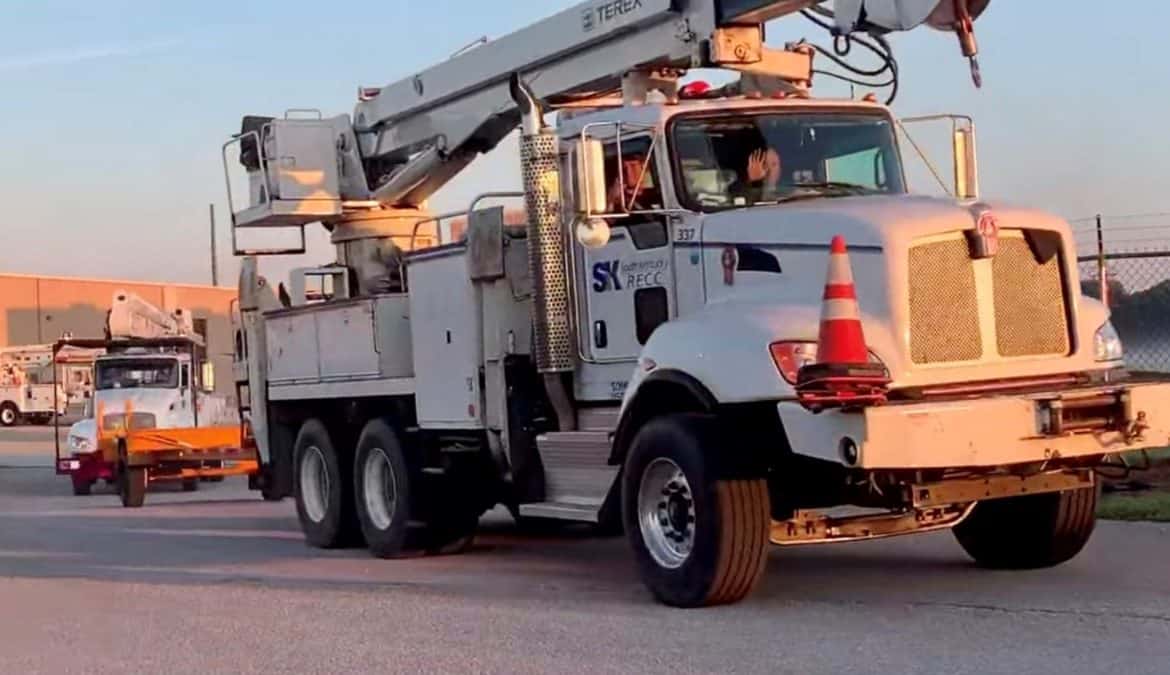(September 2, 2019) – As Georgia evacuates six coastal counties ahead of Hurricane Dorian, Kentucky co-op crews are heading that way.
More than 100 lineworkers from at least 13 electric cooperatives in Kentucky are preparing to assist sister co-ops restore power after the hurricane passes. Strong winds, heavy rain and flooding are expected in coastal Georgia where Governor Brian Kemp has declared a state of emergency for 12 southeast Georgia counties.
Citing the magnitude of Dorian as an “historic” storm, Kemp warns of downed trees, power lines, debris and flooding. Storm surge is a major threat to the Georgia coastline as Dorian moves north. The National Hurricane Center predicts it could reach 4 to 7 feet by Tuesday night into Wednesday morning.
The first Kentucky crews to deploy are South Kentucky RECC and Nolin RECC. Both co-ops will help restore power at Satilla REMC in Georgia. Fourteen lineworkers from South Kentucky RECC began their drive on Sunday, while 10 men left Nolin RECC on Monday morning.
The mutual aid response is coordinated by Kentucky Electric Cooperatives. The statewide association of Kentucky’s 26 electric co-ops participates in daily conference calls with similar co-op organizations in southeastern states to assess potential needs and pair recipient co-ops with available crews and equipment from Kentucky. In addition, Kentucky co-ops have also released dozens of construction and right-of-way contract crews to respond to Hurricane Dorian.
On Tuesday morning, about 25 Kentucky co-op lineworkers will deploy to Excelsior EMC in Georgia. Another 50 Kentucky co-op lineworkers will also deploy on Tuesday morning to Okefenoke REMC, where an additional 8 Kentucky linemen are set to join them on Wednesday.
The Kentucky electric cooperatives with crews assigned to Dorian recovery are Clark Energy, Cumberland Valley, Farmers RECC, Fleming Mason Energy, Jackson Energy, Kenergy, Meade County RECC, Nolin RECC, Owen Electric, Salt River Electric, Shelby Energy, South Kentucky RECC and Warren RECC. Other co-ops may also send crews, yet any other assignments are pending specific requests from affected co-ops.
Recent mutual aid deployments by Kentucky’s electric cooperatives include:
October 2018 – More than 100 Kentucky lineworkers help Hurricane Michael recovery efforts in Georgia and Virginia.
March 2018 – 81 Kentucky lineworkers helped restore power in Virginia after Winter Storm Riley.
September 2017 – 131 Kentucky co-op workers helped restore power in Georgia after Hurricane Irma.
October 2016 – The largest mutual aid deployment in Kentucky co-op history came in 2016 when 143 lineworkers responded to Hurricane Matthew.
The top priority of each local Kentucky co-op is service to its own consumer-members. Before committing resources to mutual aid requests, each co-op ensures it has ample crews available for all local needs, including routine maintenance and emergencies.
“We are so proud of these co-op crews,” said Chris Perry, president and CEO of Kentucky Electric Cooperatives. “These linemen have stepped up to help without even knowing exactly where they will end up. But for as unpredictable as Hurricane Dorian’s path has been, our safety team will be deliberate and careful as these crews are deployed.”
“Cooperation among cooperatives is one of our guiding principles,” said Clarence Greene, Safety and Loss Prevention Director at Kentucky Electric Cooperatives. “It’s long hours in challenging conditions, but lineworkers are wired to help people, and mutual aid deployments also provide invaluable training opportunities so these crews will be better prepared to respond to storm damage when it happens here at home.”
In addition, Louisville-based United Utility Supply Cooperative is responding to Dorian by implementing its storm emergency plan and providing round-the-clock support to meet the material needs of affected co-ops. UUS has continued to make pre-storm deliveries to cooperatives in the region and is prepared to meet their needs once storm assessments are complete. UUS has also reached out to other cooperatively owned material suppliers with assurance it stands ready to assist, if needed.
Because the national network of transmission and distribution infrastructure owned by electric cooperatives has been built to federal standards, line crews from any co-op in America can arrive on the scene ready to provide emergency support, secure in their knowledge of the system’s engineering.

